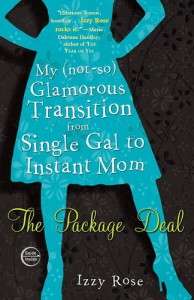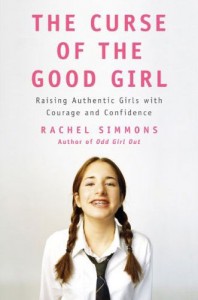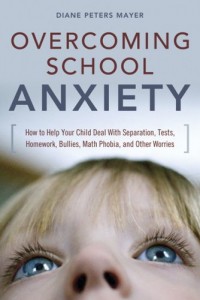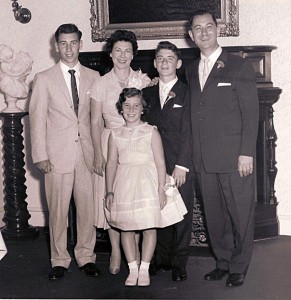|
|
November 23, 2009
 "The Package Deal: My (not-so) Glamorous Transition from Single Gal to Instant Mom" by Izzy Rose Most of us appreciate having chunks of our day-to-day existence running on auto-pilot. It’s a good thing not to have to think about which aisle in your supermarket has the oatmeal or which branch of your county library has the best collection of books on CD. You don’t have to think about this stuff. You just know it, because, well, because this is your life.
But lives aren’t carved in stone. Whether you like surprises or not, you get them. And often they make you sit up and notice that life isn’t really a 24/7 auto-pilot proposition.
What happened to me in San Francisco, years ago, was one of those surprises. I was on vacation, so yeah, I was looking for adventure but not necessarily the Turn Your Life Upside Down variety. And yet, within a couple of days of meeting David, we were both crazy in love and planning our future together. Nine months later we were married and living in San Francisco, where I knew no one except David and the dog I brought with me from Upstate New York. Left behind were my family, my friends, the wonderful school where I taught, my adorable 4th graders, the cool old house I lived in, my enormous garden, the forested paths for escaping to when I needed to be alone and pretty much everything else that was nothing like California. Did I regret my impulsive choice to marry a guy I met on vacation? Never! But I’d be lying if I didn’t admit that the first year was hard.
Transitioning from the known to the unknown can be a test of one’s creativity, resilience, self-esteem, patience and endurance. Having too much “newness” thrown at you at once can definitely leave a person wondering whether they should have taken a few slow deep breaths and looked more closely before they leaped. But too often by then you’re already up to your neck in the soup.
In this week’s podcast I talk with Izzy Rose, author of “The Package Deal: My (not-so) Glamorous Transition from Single Gal to Instant Mom” in which she chronicles the first tumultuous year of her marriage where she gave up her career, moved to Texas and became a full-time mom to her two step sons. Izzy Rose is an Emmy award-winning television producer from the San Francisco Bay Area. She’s the creator of Stepmother’s Milk, a blog and resource site for the modern-day stepmom with national and international readership. She’s appeared countless times on television and radio programs in San Francisco, Austin and Memphis and is a regular contributor to Stepmom Magazine.
Listen to my interview with Izzy Rose right here:
[QUICKTIME http://www.anniefox.com/podcast/FC012.m4a 300 300 false true]
If you have iTunes, you can subscribe to this podcast in the iTunes Store.
Or, you can download an MP3 version here.
Upcoming guests include:
Rosalind Wiseman, author of Queen Bees & Wanna Bees and Queen Bee Moms & Kingpin Dads
Diane E. Levin, co-author (with Jean Kilbourne) of So Sexy So Soon: The New Sexualized Childhood And What Parents Can Do to Protect Their Kids
Susan M. Heim, author of It’s Twins! and Chicken Soup for the Soul Twins and More
Hannah Friedman, author of Everything Sucks: Losing My Mind and Finding Myself in a High School Quest for Cool
Dara Chadwick, author of You’d Be So Pretty If…
Matthew Amster-Burton, author of Hungry Monkey: A Food-Loving Father’s Quest to Raise an Adventurous Eater
*What’s a podcast? “A podcast is a series of digital media files, usually either digital audio or video, that is made available for download via web syndication.” –Wikipedia… So, in this case, there’s an audio file for you to listen to (in addition to reading the above).

November 9, 2009
 The Curse of the Good Girl by Rachel Simmons If you live or work with teen girls you don’t need me to tell you they can be way out there with their emotions. And you already know that girl friendships can be fraught with drama, misunderstandings, betrayals and recriminations. Which proves that being emotional doesn’t automatically translate into high Emotional Intelligence. (EQ, AKA getting real with yourself so you can be real with the people you’re close to. )
When teen girl emotion explodes around parents, they often do what moms and dads of my parents’ generation did… try to contain and sanitize the feelings. Why? Perhaps some parents sincerely believe that people who are too emotional get clobbered by life. Another possibility is that when confronted with a girl’s outburst that parents can’t “fix” the next best solution is to try to shut it down as quickly as possible. Either way the message is that some emotions are just not the “good girl” kind.
If a girl expresses sadness she may hear: “Cheer up. It can’t be all that bad!”
If she expresses fear she might get: “There’s nothing to be afraid of!”
If she rages over some real or imagined injustice she may be treated to some variation of this 20th century chestnut: “Better watch it, young lady. You’re getting a little too big for your britches.”
When I was a child, the most powerful phrase I knew was “Shut up!” Only used in a rare moment of frustration and laughably tame by today’s standards, those words were consistent show stoppers in my family and always followed by: “That language is unacceptable.” I realize now that it was my assertiveness that was truly unacceptable.
21st century parental messages to girls haven’t changed all the much: Don’t be sad. Don’t be scared. Don’t be angry. Oh, and while you’re at it: Don’t be shy. Don’t be worried. Don’t be embarrassed. Don’t be so silly. Don’t be so dramatic. Don’t be so smart.
If girls can’t be any of those things, what, in heaven’s name, are they supposed to be? Duh! They’re supposed to be GOOD! At all times sweet, loving and cooperative. Modest, supportive, nurturing, generous and nice. But what are girls expected to do when any of those other not so good and not so nice feelings pop up? No problem. If you want to be a good girl (Yes, please!) you learn to stuff it and smile.
In this week’s podcast I talk with Rachel Simmons, author of The Curse of the Good Girl: Raising Authentic Girls with Courage and Confidence. And what a terrific and important book it is. Here’s an excerpt:
________
To deepen your vision for your daughter, write her a letter (you don’t have to send it) and explore these questions:
- What do you wish you had known when you were her age? Think about the girl you used to be and the woman you are today. Focus on what you have learned about relationships, conflict, and self-confidence.
- What does being yourself mean to you?
- What did the female role models of your childhood teach you? If you did not have any, what do you wish you might have learned from a caring adult woman?
You have learned many lessons in your life. By defining them for yourself, you can begin thinking about how to convey practical wisdom to your daughter, in both what you say and how you act.
____________
Listen to my interview with Rachel Simmons right here:
[QUICKTIME http://www.anniefox.com/podcast/FC011.m4a 300 300 false true]
If you have iTunes, you can subscribe to this podcast in the iTunes Store.
Or, you can download an MP3 version here.
Upcoming guests include:
Rosalind Wiseman, author of Queen Bees & Wanna Bees and Queen Bee Moms & Kingpin Dads
Izzy Rose, author of The Package Deal: My (not-so) Glamorous Transition from Single Gal to Instant Mom
Diane E. Levin, co-author (with Jean Kilbourne) of So Sexy So Soon: The New Sexualized Childhood And What Parents Can Do to Protect Their Kids
Susan M. Heim, author of It’s Twins! and Chicken Soup for the Soul Twins and More
Hannah Friedman, author of Everything Sucks: Losing My Mind and Finding Myself in a High School Quest for Cool
Dara Chadwick, author of You’d Be So Pretty If…
*What’s a podcast? “A podcast is a series of digital media files, usually either digital audio or video, that is made available for download via web syndication.” –Wikipedia… So, in this case, there’s an audio file for you to listen to (in addition to reading the above).

October 26, 2009
 Overcoming School Anxiety by Diane Peters Mayer Ask any 6th-12th grader “What stresses you out?” and unless it’s the 4th of July the kid is likely to say without hesitation, school. Maybe it’s the social pressure pitting outsiders against insiders. Or the brain-numbing schedule flipping from The Treaty of Versailles to mitochondria to the Quadratic equation at 50 minute intervals. Perhaps it’s the crush who mercilessly crushed you or the coach who never lets you play. Whatever it is, waking up on a school day and wishing it was Saturday is totally normal. On the other hand, sometimes parents see kids resisting school with such ferocity that something else is going on. That something else may be School Refusal Behavior and it isn’t normal. Not as in: normal functioning. It’s a recognized anxiety disorder that takes “I don’t like school” to a whole other level where a child’s fears get in the way of … living.
According to Dr. Christopher Kearney, an expert on school refusal disorder, this problem affects 5% to 28% of children during their school lives. Most commonly affected group? Not little kindergartners, but 12-18 year olds.
In case this is all new to you, School Refusal Behavior has nothing to do with students preferring to slack off instead of going to class. Kids suffering with this are terrified of going to school. Even parents who never loved school may be baffled, embarrassed or frustrated by the child’s behavior. They may wonder, “Why can’t she just drop all this drama and get herself out the door?” If a parent isn’t informed, it’s a reasonable question.
Maggie Hahn, Clinical Coordinator of the Adolescent Psychiatric Unit at Northwest Community Hospital in Arlington Heights, IL. has an answer:
“It breaks down into two reasons,” she says “Some (kids) are terrified of something in school, either taking tests, or thinking that the other kids are laughing at them. Others have actual separation anxiety, and are afraid that something bad will happen at home while they are gone.”
To give you a sense of what it can feel like for the kid, here are some emails I’ve gotten:
For some reason I don’t really fit in with other teens. I have a habit of making every situation with new friends really awkward or people think I am weird. I don’t do anything outright to make them think this but a lot of the time I don’t know what to say to someone I have just met and then I get nervous. I hate the way I am and it makes it really difficult for me to make friends in new environments. I guess I just don’t quite have the quick wit or sense of humor necessary to make people like me or something. Anyway my social anxiety is a big problem because I am going to a new school and leaving my two friends next year and I am going to have to make new ones and I don’t know how to get over my problems so people like me. Please help!
And this one:
I used to love to learn but it seems as though ever since 10th grade I’ve gotten slower and I know that I do suffer from anxiety, but of course mom doesn’t believe me. I want to get my life straight and I need help.
Doesn’t sound like much fun. And too many students suffering from School Anxiety don’t let anyone know how bad it is for them. That’s a shame, because these problems can be treated successfully. The first step is helping parents understand what is and what isn’t perfectly normal when their kids start to show signs of avoiding school. The other part is knowing what resources are out there to help parents help their kids.
In this week’s podcast I talk with Diane Peters Mayer, author of Overcoming School Anxiety: How to Help Your Child Deal with Separation, Tests, Homework, Bullies, Math Phobia, and Other Worries.
Have a listen here:
[QUICKTIME http://www.anniefox.com/podcast/FC010.m4a 300 300 false true]
If you have iTunes, you can subscribe to this podcast in the iTunes Store.
Or, you can download an MP3 version here.
Upcoming guests include:
Rachel Simmons, author of The Curse of the Good Girl: Raising Authentic Girls with Courage and Confidence
Rosalind Wiseman, author of Queen Bees & Wanna Bees and Queen Bee Moms & Kingpin Dads
Izzy Rose, author of The Package Deal: My (not-so) Glamorous Transition from Single Gal to Instant Mom
Diane E. Levin, co-author (with Jean Kilbourne) of So Sexy So Soon: The New Sexualized Childhood And What Parents Can Do to Protect Their Kids
Susan M. Heim, author of It’s Twins! and Chicken Soup for the Soul Twins and More
Hannah Friedman, author of Everything Sucks: Losing My Mind and Finding Myself in a High School Quest for Cool
Dara Chadwick, author of You’d Be So Pretty If…
Special thanks to our friend and musician/composer Curt Siffert who let us use his song, “Kingdom” for the opening of this podcast.
*What’s a podcast? “A podcast is a series of digital media files, usually either digital audio or video, that is made available for download via web syndication.” –Wikipedia… So, in this case, there’s an audio file for you to listen to (in addition to reading the above).

October 14, 2009
 As we were in 1959 Today I interviewed Rachel Simmons for my podcast series: Family Confidential: Secrets of Successful Parenting. (No, it’s not posted yet. Gimme a week or two, ok?) We talked about her must-read new book The Curse of the Good Girl: Raising Authentic Girls with Courage and Confidence and about emotional intelligence. For me, EI (aka EQ) is the ability to:
- identify what you’re feeling
- accept the emotion as it is (without editorializing about your right to feel it)
- express emotion in responsible ways to people who need to hear what you have to say
I’ve immersed myself in this stuff for decades and love talking with people like Rachel, who’ve also made EI their life’s work.
After the interview I recalled a 2003 keynote speech I delivered in Los Angeles. The title: Why 21st Century Kids Need 21st Century Parenting. This feels as good a time as any for a revisit. Here’s a excerpt:
Before we were parents we had parents. People who showed us what it took to be a mom and a dad.
I woke up one morning when I was 5 and heard my mother sobbing behind the door of her room, my father comforting her. My brothers told me that Grandpa had died. A while later, Mom emerged, hair freshly brushed, lipstick bright red. She cheerfully asked what I wanted for breakfast. I wasn’t hungry, I was confused. I wanted to ask about Grandpa, but Mom’s tight smile warned me not to say anything that might upset her. While I pushed a piece of French toast around my plate I had a realization–an absolute epiphany: To be a grown-up means that you have to hide your sadness!
When I was 15 my father died suddenly of a heart attack. His passing left a huge hole in my heart, but instead of grieving I did what I thought grown-ups do, I suppressed my sadness.
Fast-forward 25 years. I’m in the dentist’s chair getting a replacement for an old childhood filling. The doctor pauses in the procedure, gently rests a hand on my head and asks how I’m doing. At his touch a tidal wave of sadness overwhelms me and I start weeping. For the next 48 hours I’m emotionally numb and clueless about what the hell is happening.
David helped me realize that the dentist’s touch had reminded me of my father, who often tousled my hair. With that revelation, the floodgates burst… finally I was able to grieve for my dad. And through my expression of loss I released myself from feelings which held me hostage for decades.
That day I learned about the power of unexpressed emotions. They don’t actually ever go away. Instead, they work like a mild acid, slowly eroding your insides, boring holes in your emotional foundation, creating gaps in your ability to connect with others. I decided not to ever bury feelings that need to be expressed. I vowed to teach my children, through my own example, to express their emotions in healthy ways.
I got my chance soon enough. During most of 1994 my mom was dying of Lou Gehrig’s Disease. Every day I drove an hour each way to visit her. During endless games of Scrabble we finally found the words to communicate with an intimacy we’d never shared before. I am eternally grateful for those last 10 months we had together… grace-filled and excruciatingly painful as they were.
After spending the day with Mom I’d arrive home each night to my own family, scared, stressed, worn down and so raw. I offered no one a lipstick smile. Instead, I trusted that our daughter and son (then ages 15 and 9) would know how to respond to a person in need. And they did. Their backrubs, cups of tea and loving words of encouragement got me through that endless year. I don’t know how I’d have coped if not for David and our sweet kids. If I’d chosen to play the game of “Everything’s fine, honey” I’d have betrayed myself and robbed my children of an opportunity to learn what it means to be a real human being. By sharing the truth of my emotional experience I gave them the chance to exercise their compassion (toward me and their grandmother) and to grow beautifully toward adulthood.
For years we’re on the receiving end of our parents’ choices, observing closely everything they do. As little children we accept that they knew best about what we need. As teens we wonder if they’ve got a clue about who we were or how to parent. After all that watching and evaluating and on the job training with kids of our own, at this point, what could we possibly not know about being a parent?
We know it all, right?
 — Older Posts »
| |















